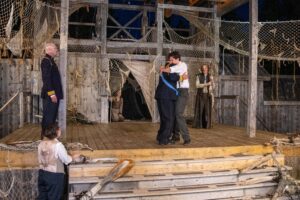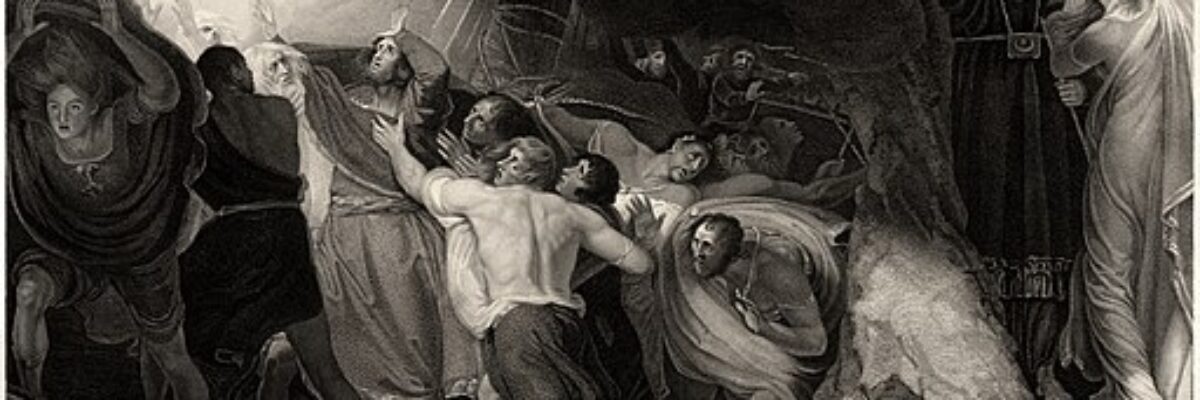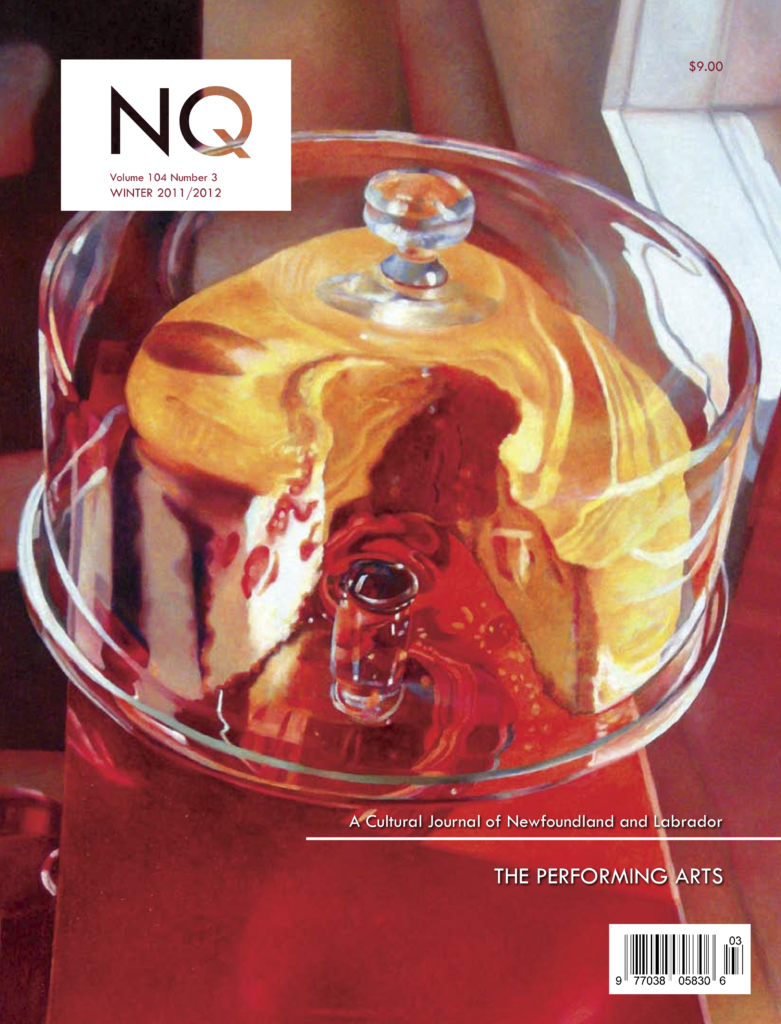“Shakespeare might well have called our island ‘one built by Nature for herself / Against infection and the hand of war’,” by Paul Rowe
October 2022
Newfoundland and Labrador is a place of the sea. To paraphrase Keats: Its eternal whisperings have been heard for eons against our desolate shores. Even when the cod stocks were decimated, the sea yielded up its fossilised treasures to keep the wolf from our economic door. We are also a place of storms, many of them memorable, some painful to recall. So, perhaps it should come as no surprise that Shakespeare’s play The Tempest, which begins with a violent storm besetting an island in an unnamed sea, has seen several landmark productions in Newfoundland and Labrador.
It was performed at the LSPU Hall on the terrible night the Ocean Ranger went down in February 1982. It was the first production undertaken by Shakespeare by the Sea (SBTS) almost 30 years ago on the rocks of Logy Bay. It has had two productions at the Trinity Festival and two more at the Perchance Theatre Company’s Elizabethan-style Indeavour stage in Cupids. I attended a performance of the more recent Perchance production, the last one of its 2022 Season, on Sunday, August 28, 2022. For a number of reasons, I felt it was a watershed moment in playing Shakespeare in this province.
 I begin with the lead, Prospero, played in this instance by well-known actor-musician-composer Jodee Richardson. It was entirely refreshing to see a performer highlight Prospero’s poverty and anger more than his gravitas and compassion. We saw a man who had once occupied a place of wealth and privilege now reduced to living in a cave, raising and educating his child, Miranda, alone while supervising the activities of unwilling and occasionally dangerous servants. Richardson’s Prospero was unapologetically scheming and vengeful, firm and direct (though affectionate) with his daughter Miranda and attendant Ariel, and, above all, hungry to capitalise on the turn of fortune that has put his enemies, especially his usurping brother, now King of Naples, in his grasp, yet clearly uncertain and anxious about the outcome. Finally, he only reluctantly, and as a last resort, becomes compassionate and forgiving in the end. The actor seemed younger, the voice lighter, the beard shorter, than any Prospero I’ve seen played by a man. It was, as I say, a refreshing take on the character.
I begin with the lead, Prospero, played in this instance by well-known actor-musician-composer Jodee Richardson. It was entirely refreshing to see a performer highlight Prospero’s poverty and anger more than his gravitas and compassion. We saw a man who had once occupied a place of wealth and privilege now reduced to living in a cave, raising and educating his child, Miranda, alone while supervising the activities of unwilling and occasionally dangerous servants. Richardson’s Prospero was unapologetically scheming and vengeful, firm and direct (though affectionate) with his daughter Miranda and attendant Ariel, and, above all, hungry to capitalise on the turn of fortune that has put his enemies, especially his usurping brother, now King of Naples, in his grasp, yet clearly uncertain and anxious about the outcome. Finally, he only reluctantly, and as a last resort, becomes compassionate and forgiving in the end. The actor seemed younger, the voice lighter, the beard shorter, than any Prospero I’ve seen played by a man. It was, as I say, a refreshing take on the character.
This interpretation had to be influenced by Perchance Artistic Director Danielle Irvine, a director, it would seem, at the top of her game at this point in her career. Even if she gave Richardson free rein as Prospero (and I doubt it) her deft touch could be seen throughout the production. The soundscape (also done, impressively, by Richardson) was used to great effect, the costumes were simple but elegant, the casting was impeccable, and the staging in and around the open-air Indeavour, with its thrust-stage, pit, galleries, and multiple points of entry, was sure and trouble-free.But the words were best of all, and perhaps the best indicator of the director’s work. The actors knew what they were saying, always centering their text in their given circumstances.
As for the cast members, they were but twelve, an accomplishment in itself. Jerry Etienne was intensely emotional as King Alonso, exhibiting grief I thought appropriate to a man experiencing the supposed loss of his son, Ferdinand. It would be hard to imagine a more perfect pairing of Miranda and Ferdinand than Claire Donnan and Owen Carter and the two young actors acquitted themselves admirably. Sarah Conway was an inspired choice to play the nattering, but deeply affectionate and loyal, Gonzalo. Una Hill-McMullin brought clarity to the character of Adrian and sang beautifully as Ceres. Paul Ewan Wilson and Evan Mercer had the somewhat thankless task of playing Antonio and Sebastian, respectively, since those two more or less fade into the background after their chilling aborted-murder scene. The scene itself, however, was excellently done. Erika Squires was a fine Ariel, Michael Nolan a good Trinculo, and Owen Van Houten was outstanding as both the drunken Stephano and the salty Boatswain. Blake Pyne, a very good Caliban, treated everyone to a magical first entrance by dint of his impressive core strength.
Alas, it is the treatment of these last three characters together (Stephano, Trinculo, and Caliban) that causes me to sound my only discordant note. The plot to kill Prospero can never be taken seriously, as it is driven by this inept and drunken trio, so the raison d’être of their scenes must reside in the comedy. Although the individual performances were strong, I found that the humour did not come through as well as it might have. The director, it seemed to me, was less interested in these scenes than in the weighty travails of the more serious characters. True or no, it is a small fault in an otherwise impeccable production, one of the most enjoyable performances of a Shakespeare play that I have seen.
Anywhere.
I think we have something really special happening with Shakespeare in Newfoundland and Labrador. Of course, as a sea-bound place which includes an island in the Atlantic, we occupy fertile ground for staging his works. Writing as he was from his own sceptred isle, Shakespeare’s plays often display an interesting relationship with the sea. Though The Tempest, to my knowledge, is the only one set specifically on another island, The Comedy of Errors and A Merchant of Venice both take place in coastal cities with active seaports. Also in Comedy, the two sets of identical twins are separated at birth by a sea storm. Interestingly, both these plays have also seen their share of NL productions. Pericles, Prince of Tyre, authored at least in part by Shakespeare, has much of its high drama, including the unbearably poignant recognition scene between the titular hero and his long-lost daughter, take place on ships at sea. This rarely performed piece saw the light of day at The Rooms Fortis Amphitheatre last summer.
In yet another instance, the Queen in Cymbeline – King of Britain refers to her ancient isle as Neptune’s park, ribbed and paled in / With rocks unscalable and roaring waters, a description perfectly suited to the SBTS production of the play on Signal Hill in 2013. Though NL’s much harsher climate might rank it somewhat less than a demi-paradise or a precious stone set in the silver sea — epithets on England from a speech in Richard II — Shakespeare might well have called our place one built by Nature for herself / Against infection and the hand of war.”
To return to Perchance Theatre and the Cupids connection, it is interesting to note that the settlement there was undertaken during the latter part of Shakespeare’s writing career. (He died, after a brief retirement, in 1616.) So, not only is it possible that Shakespeare himself, an active businessman in his day, was aware of the goings-on in Newfoundland at the time, it is also quite possible that some of the participants in John Guy’s settlement had attended Shakespeare’s plays in London. Perhaps one of them had worked for a time as an actor and had been in one of Shakespeare’s productions! We might speculate endlessly about such things, but we can rest assured that this place of ours provides a wonderful setting for much of the Shakespearean canon. There’s been great progress in presenting that catalogue in recent years and we owe it to ourselves, I think, to keep adding to that legacy.
Paul Rowe is an actor/writer living in St John’s. He has performed in Shakespeare’s plays at The Trinity Festival, with New World Theatre, and with Shakespeare by the Sea. He was the Artistic Director of Shakespeare by the Sea from 2018 – 2020.
(Images: The Tempest Act 1, Scene 1, by George Romney; from the Perchance production summer 2022)
This is the first of an ocean-focused series, made possible by The Big Splash Fund. The next piece will be posted in two weeks.



